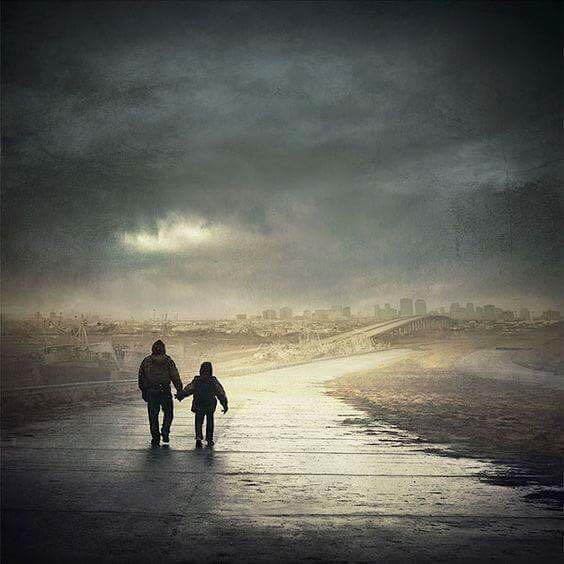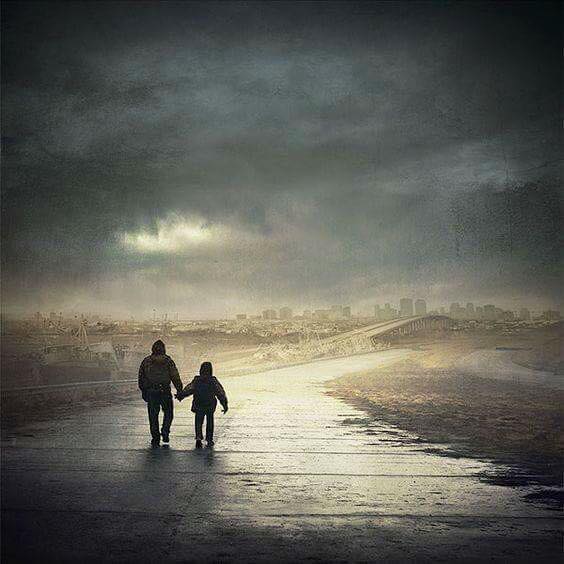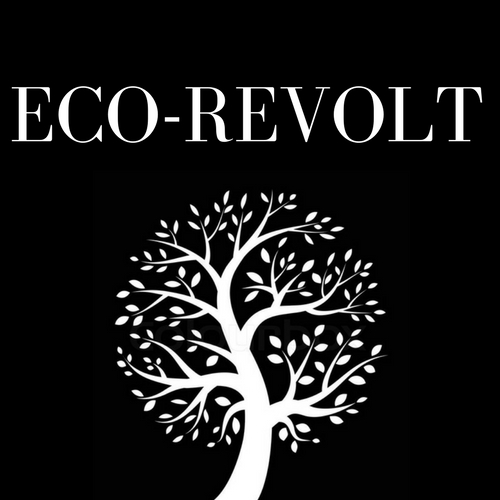“The Flow that never stops,
In which all things are dissolved,
And feet always discover the icy thrill that jumps into the gut
That accompanies the experience of the New.
We are and are not.” Ramon Elani
I’ve been thinking about my potential to be a father recently. In my book Feral Consciousness: Deconstruction of the Modern Myth and Return to the Woods I present an argument for radical environmentalism based in an individualist anarchist philosophy, that places life, as a process of self-actualising and will to power, tied to Being as being-in-the-world-as-wildness within a multiplicity, as the basis of all argument. And, from this outlook, I’ve found the idea of fathering children to be an important aspect of my own embrace of life, as part of my immediate biological-animality/power-in-the-world, and as a means of effecting the world in ways I find desirable – I would raise my children in such a way to forge intimate personal relationships with the world and to fight for it in whatever ways they can.
However, due to medical issues earlier in my life – pineal germ cell tumour, to which I received radiation therapy to treat – there is a potential side effect of my becoming infertile due to side effects of the treatment. As you might well expect, this is effecting me in a deeply personal way – especially given that my desire to be a father is a huge motivation for other areas of my life. So I’ve been re-exploring ideas on the subject.
Some of my green and environmentalist friends have made the decision to not have children, so as to not contribute to the population crisis and because they believe that it is too cruel to bring a child into this world given the horrific future we face with the collapse of the biosphere we are witness (mirroring anti-natalist arguments I will come to in a little bit). And it is true that, with civilisation/humanity-as-we-know-it having potentially less than 10 years left – my own expectation is closer to 20 years, but I could be wrong – I can sympathise with this position.
In response to a piece written by anarcho-primitivist Kevin Tucker where he articulates many of his own thoughts on parenting as a primitivist (sadly this is no longer available to read online), eco-extremist writer Cabrera articulates his own nihilist approach to parenting. He writes –
“What if nihilist parenting is parenting in the now, with all of its contradictions, with all of the things we don’t like? I feel strongly that the idea that I could promise my children “a better world,” would simply be the wrong mentality to have. The most I can hope for is to be there and be strong for those I love, and that’s it. There is a strength and resilience that one either has or one doesn’t. I don’t think it has to do with mere survival, it has more to do with realizing that there is more to life than just survival. We aren’t free, no, and to be honest, I think talking about “freedom” is rather stupid in our circumstance. It really is more a question of if life is meaningful, and if there is more to life than scrounging and groveling for our existence.
To be honest, as a parent, I cannot worry about tomorrow that much. And if I do, I miss so much. Part of my honesty is to tell my girls that they are mortal. They know that they are mortal, they know that we disappear to make way for others. That’s not “hopelessness” or “nihilism” (really), that’s just life. That’s part of the joy of being human, it’s to take your lumps like any animal. The last thing that I want them to do (though I have little control over this) is to sacrifice themselves for an ideal that they have no stake in, even if it is something as “fundamental” as the survival of the species a few generations from now.” Cabrera
I can sympathise with a great deal with what Cabrera writes here. I sympathised with a great deal of what Tucker wrote in the piece this quote is part of the response of.
I might be guilty of wishing them to – in my own aforementioned desires to have children – as Cabrera puts it “sacrifice themselves for an ideal they have no stake in”. But as I see myself and other living beings (and as I argue in Feral Consciousness), my selfhood is perpetually an extension of Being, which is part of a ecological community that spans bioregion of this planet. So in an entirely non-idealised and egoist sense, I have an immediate stake in this stuff and they would also. So that part of Cabrera’s argument is one I do not share.
Lets delve deeper into this though. We’re all familiar with neo-pagan, Gaia, Mother Earth stuff, that presents a picture of nature as a deeply maternal and feminine entity. This is not a description that fits my personal relationship with wildness, but as far as internalised psychic objects go, it seems that this mother conception fits, in a general cultural sense – with civilisation, its rulers and gods being the phallus that fucks everything. So, is it fair to the child to bring them into a world where their mother is dying? All of our personal-mothers die at some point, and the grief is something greater than “loss”. I have personal experience of this, having witnessed my mothers passing before I was 10. And thing that I learnt from this experience is that the way to overcome the hurt and everything else was to use it to overcome the situations I found myself in, through self-actualising and empowerment. The hurt toughened me in some areas. It made me creative. The experiences helped me forge ways of approaching familial relationships that are based in communistic-egoistic-welfare. I still mourn the loss of my mother, nearly 18 years later, but I value what the experience did for me. Perhaps amidst the horrors of civilisations collapse, within whatever is left of the biosphere, the children I might father would/will develop similar relationships towards their own experiences? Some want to shadow the children they parent from our situation and what they will have to face. This though seems to me the crueller option.
But what of the aforementioned anti-natalists? To them it is fundamentally immoral to bring children in the world, as it will lead to inevitable suffering. And amidst a rising tide of philosophies of nihilism and pessimism in radical and anarchist discourse, which I share sympathies with, I can appreciate the reasoning that they present, from a hedonist-utilitarian perspective. But as I argue in my critique of hedonism, I do not find pleasure or absence of pain to be an adequate determiner for value, favouring an embrace of life as a determiner for value. I’ve made a start on my second book where I discuss this in one section –
“Positions of anti-natalism and certain forms of pessimism, while possibly the logical conclusion of hedonist-utilitarian moral theories that appeal to the happiness of idealised hypothetical children, whose relevance are limited to the symbology of language, does not appear to fit the wild, nihilistic naturalism of a feral-iconoclast ontology. This is because, rather than arguing from positions of egoist-welfarism, these arguments appear to Otherise the topic into a romantic moral drama, with soap opera sentimentalities. But if we approach the subject of whether or not to reproduce from the angle of feral animality, it appears that it is natural – in a sensible description of the term – to self-propagate through the medium of reproduction, as a means of expressing will-to-power.
If we take the anti-natalist existence = pain = bad and non-existence = no-pain = not-bad, this does not fit the wild authenticity of living beings who have struggled to survive through previous mass extinction events and reproduced amidst all the suffering that those events entailed. Nor does it fit what we witness amidst our current mass extinction event, with wildlife continuing to procreate regardless of the horror they are situated within.”
In the section of of poem I quote at the start of this piece, my internet-friend Ramon Elani writes “we are and we are not”. This resonates deeply with my love of existentialist works of philosophy. This is how I see my potential children. As far as freedom goes, in a metaphysical sense, I see the wild-natural as located between determinist and indeterminist, as a-deterministically potentialist. My children as a potential both are and are not. The side effects from cancer treatment might determine that I am unable to father genetic kin, and this would be deeply saddening for me. If that is the situation I face then I will need to overcome it to achieve what I desire – probably in the form of adopting a child who has no one. This is will involve me actualising a potential through my will. This will be my acting in revolt to that which distances me from what I desire.
In the book Into The Forest (I must confess to having only seen the film) the sister Eva decides to keep the child she was impregnated with after being raped, while living within the collapse of civilisation. She does it as an act of determination – she determines that she is not going to be a victim of her circumstances and actualises the child as an extension of her Being, within the flow of energy and matter. This is a defiant act of revolt and an embrace of life and is something I personally find quite beautiful.
The potential for future children to perform actions that lead to desirable outcomes for the planet’s ecosystem and as desirable potentialities within the process of living for me seems good reason to seek to parent children. Perhaps I will be able to do so biologically and if not socially. Only I (and my partner) can actualise this into Being.



Reblogged this on vegan anarchist primitivist.
LikeLiked by 1 person